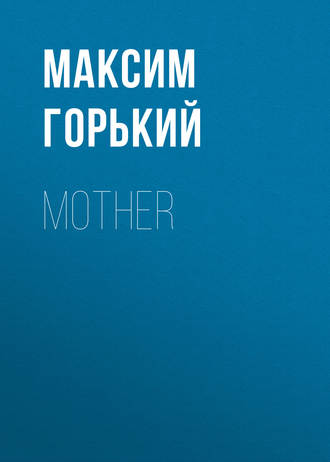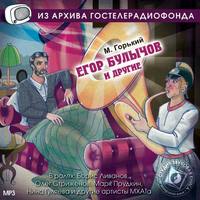 полная версия
полная версияMother
CHAPTER X
The upshot of the conversation was that the next day at noon the mother was seen in the factory yard with two pots of eatables from Marya's culinary establishment, while Marya herself transferred her base of operations to the market place.
The workmen immediately noticed their new caterer. Some of them approached her and said approvingly:
"Gone into business, Nilovna?"
They comforted her, arguing that Pavel would certainly be released soon because his cause was a good one. Others filled her sad heart with alarm by their cautious condolence, while still others awoke a responsive echo in her by openly and bitterly abusing the manager and the gendarmes. Some there were who looked at her with a vindictive expression, among them Isay Gorbov, who, speaking through his teeth, said:
"If I were the governor, I would have your son hanged! Let him not mislead the people!"
This vicious threat went through her like the chill blast of death. She made no reply, glanced at his small, freckled face, and with a sigh cast down her eyes.
She observed considerable agitation in the factory; the workmen gathered in small groups and talked in an undertone, with great animation; the foremen walked about with careworn faces, poking their noses into everything; here and there were heard angry oaths and irritated laughter.
Two policemen escorted Samoylov past her. He walked with one hand in his pocket, the other smoothing his red hair.
A crowd of about a hundred workmen followed him, and plied the policemen with oaths and banter.
"Going to take a promenade, Grisha?" shouted one.
"They do honor to us fellows!" chimed in another.
"When we go to promenading, we have a bodyguard to escort us," said a third, and uttered a harsh oath.
"It does not seem to pay any longer to catch thieves!" exclaimed a tall, one-eyed workingman in a loud, bitter voice. "So they take to arresting honest people."
"They don't even do it at night!" broke in another. "They come and drag them away in broad daylight, without shame, the impudent scoundrels!"
The policemen walked on rapidly and sullenly, trying to avoid the sight of the crowd, and feigning not to hear the angry exclamations showered upon them from all sides. Three workmen carrying a big iron bar happened to come in front of them, and thrusting the bar against them, shouted:
"Look out there, fishermen!"
As he passed Nilovna, Samoylov nodded to her, and smiling, said:
"Behold, this is Gregory, the servant of God, being arrested."
She made a low bow to him in silence. These men, so young, sober, and clever, who went to jail with a smile, moved her, and she unconsciously felt for them the pitying affection of a mother. It pleased her to hear the sharp comments leveled against the authorities. She saw therein her son's influence.
Leaving the factory, she passed the remainder of the day at Marya's house, assisting her in her work, and listening to her chatter. Late in the evening she returned home and found it bare, chilly and disagreeable. She moved about from corner to corner, unable to find a resting place, and not knowing what to do with herself. Night was fast approaching, and she grew worried, because Yegor Ivanovich had not yet come and brought her the literature which he had promised.
Behind the window, gray, heavy flakes of spring snow fluttered and settled softly and noiselessly upon the pane. Sliding down and melting, they left a watery track in their course. The mother thought of her son.
A cautious rap was heard. She rushed to the door, lifted the latch, and admitted Sashenka. She had not seen her for a long while, and the first thing that caught her eye was the girl's unnatural stoutness.
"Good evening!" she said, happy to have a visitor at such a time, to relieve her solitude for a part of the night. "You haven't been around for a long while! Were you away?"
"No, I was in prison," replied the girl, smiling, "with Nikolay Ivanovich. Do you remember him?"
"I should think I do!" exclaimed the mother. "Yegor Ivanovich told me yesterday that he had been released, but I knew nothing about you. Nobody told me that you were there."
"What's the good of telling? I should like to change my dress before Yegor Ivanovich comes!" said the girl, looking around.
"You are all wet."
"I've brought the booklets."
"Give them here, give them to me!" cried the mother impatiently.
"Directly," replied the girl. She untied her skirt and shook it, and like leaves from a tree, down fluttered a lot of thin paper parcels on the floor around her. The mother picked them up, laughing, and said:
"I was wondering what made you so stout. Oh, what a heap of them you have brought! Did you come on foot?"
"Yes," said Sashenka. She was again her graceful, slender self. The mother noticed that her cheeks were shrunken, and that dark rings were under her unnaturally large eyes.
"You are just out of prison. You ought to rest, and there you are carrying a load like that for seven versts!" said the mother, sighing and shaking her head.
"It's got to be done!" said the girl. "Tell me, how is Pavel? Did he stand it all right? He wasn't very much worried, was he?" Sashenka asked the question without looking at the mother. She bent her head and her fingers trembled as she arranged her hair.
"All right," replied the mother. "You can rest assured he won't betray himself."
"How strong he is!" murmured the girl quietly.
"He has never been sick," replied the mother. "Why, you are all in a shiver! I'll get you some tea, and some raspberry jam."
"That's fine!" exclaimed the girl with a faint smile. "But don't you trouble! It's too late. Let me do it myself."
"What! Tired as you are?" the mother reproached her, hurrying into the kitchen, where she busied herself with the samovar. The girl followed into the kitchen, sat down on the bench, and folded her hands behind her head before she replied:
"Yes, I'm very tired! After all, the prison makes one weak. The awful thing about it is the enforced inactivity. There is nothing more tormenting. We stay a week, five weeks. We know how much there is to be done. The people are waiting for knowledge. We're in a position to satisfy their wants, and there we are locked up in a cage like animals! That's what is so trying, that's what dries up the heart!"
"Who will reward you for all this?" asked the mother; and with a sigh she answered the question herself. "No one but God! Of course you don't believe in Him either?"
"No!" said the girl briefly, shaking her head.
"And I don't believe you!" the mother ejaculated in a sudden burst of excitement. Quickly wiping her charcoal-blackened hands on her apron she continued, with deep conviction in her voice:
"You don't understand your own faith! How could you live the kind of life you are living, without faith in God?"
A loud stamping of feet and a murmur of voices were heard on the porch. The mother started; the girl quickly rose to her feet, and whispered hurriedly:
"Don't open the door! If it's the gendarmes, you don't know me. I walked into the wrong house, came here by accident, fainted away, you undressed me, and found the books around me. You understand?"
"Why, my dear, what for?" asked the mother tenderly.
"Wait a while!" said Sashenka listening. "I think it's Yegor."
It was Yegor, wet and out of breath.
"Aha! The samovar!" he cried. "That's the best thing in life, granny! You here already, Sashenka?"
His hoarse voice filled the little kitchen. He slowly removed his heavy ulster, talking all the time.
"Here, granny, is a girl who is a thorn in the flesh of the police! Insulted by the overseer of the prison, she declared that she would starve herself to death if he did not ask her pardon. And for eight days she went without eating, and came within a hair's breadth of dying. It's not bad! She must have a mighty strong little stomach."
"Is it possible you took no food for eight days in succession?" asked the mother in amazement.
"I had to get him to beg my pardon," answered the girl with a stoical shrug of her shoulders. Her composure and her stern persistence seemed almost like a reproach to the mother.
"And suppose you had died?" she asked again.
"Well, what can one do?" the girl said quietly. "He did beg my pardon after all. One ought never to forgive an insult, never!"
"Ye-es!" responded the mother slowly. "Here are we women who are insulted all our lives long."
"I have unloaded myself!" announced Yegor from the other room. "Is the samovar ready? Let me take it in!"
He lifted the samovar and talked as he carried it.
"My own father used to drink not less than twenty glasses of tea a day, wherefor his days upon earth were long, peaceful, and strong; for he lived to be seventy-three years old, never having suffered from any ailment whatsoever. In weight he reached the respectable figure of three hundred and twenty pounds, and by profession he was a sexton in the village of Voskresensk."
"Are you Ivan's son?" exclaimed the mother.
"I am that very mortal. How did you know his name?"
"Why, I am a Voskresenskian myself!"
"A fellow countrywoman! Who were your people?"
"Your neighbors. I am a Sereguin."
"Are you a daughter of Nil the Lame? I thought your face was familiar! Why, I had my ears pulled by him many and many a time!"
They stood face to face plying each other with questions and laughing. Sashenka looked at them and smiled, and began to prepare the tea. The clatter of the dishes recalled the mother to the realities of the present.
"Oh, excuse me! I quite forgot myself, talking about old times. It is so sweet to recall your youth."
"It's I who ought to beg your pardon for carrying on like this in your house!" said Sashenka. "But it is eleven o'clock already, and I have so far to go."
"Go where? To the city?" the mother asked in surprise.
"Yes."
"What are you talking about! It's dark and wet, and you are so tired. Stay here overnight. Yegor Ivanovich will sleep in the kitchen, and you and I here."
"No, I must go," said the girl simply.
"Yes, countrywoman, she must go. The young lady must disappear. It would be bad if she were to be seen on the street to-morrow."
"But how can she go? By herself?"
"By herself," said Yegor, laughing.
The girl poured tea for herself, took a piece of rye bread, salted it, and started to eat, looking at the mother contemplatively.
"How can you go that way? Both you and Natasha. I wouldn't. I'm afraid!"
"She's afraid, too," said Yegor. "Aren't you afraid, Sasha?"
"Of course!"
The mother looked at her, then at Yegor, and said in a low voice, "What strange – "
"Give me a glass of tea, granny," Yegor interrupted her.
When Sashenka had drunk her glass of tea, she pressed Yegor's hand in silence, and walked out into the kitchen. The mother followed her. In the kitchen Sashenka said:
"When you see Pavel, give him my regards, please." And taking hold of the latch, she suddenly turned around, and asked in a low voice: "May I kiss you?"
The mother embraced her in silence, and kissed her warmly.
"Thank you!" said the girl, and nodding her head, walked out.
Returning to the room, the mother peered anxiously through the window. Wet flakes of snow fluttered through the dense, moist darkness.
"And do you remember Prozorov, the storekeeper?" asked Yegor. "He used to sit with his feet sprawling, and blow noisily into his glass of tea. He had a red, satisfied, sweet-covered face."
"I remember, I remember," said the mother, coming back to the table. She sat down, and looking at Yegor with a mournful expression in her eyes, she spoke pityingly: "Poor Sashenka! How will she ever get to the city?"
"She will be very much worn out," Yegor agreed. "The prison has shaken her health badly. She was stronger before. Besides, she has had a delicate bringing up. It seems to me she has already ruined her lungs. There is something in her face that reminds one of consumption."
"Who is she?"
"The daughter of a landlord. Her father is a rich man and a big scoundrel, according to what she says. I suppose you know, granny, that they want to marry?"
"Who?"
"She and Pavel. Yes, indeed! But so far they have not yet been able. When he is free, she is in prison, and vice versa." Yegor laughed.
"I didn't know it!" the mother replied after a pause. "Pasha never speaks about himself."
Now she felt a still greater pity for the girl, and looking at her guest with involuntary hostility, she said:
"You ought to have seen her home."
"Impossible!" Yegor answered calmly. "I have a heap of work to do here, and the whole day to-morrow, from early morning, I shall have to walk and walk and walk. No easy job, considering my asthma."
"She's a fine girl!" said the mother, vaguely thinking of what Yegor had told her. She felt hurt that the news should have come to her, not from her son, but from a stranger, and she pressed her lips together tightly, and lowered her eyebrows.
"Yes, a fine girl!" Yegor nodded assent. "There's a bit of the noblewoman in her yet, but it's growing less and less all the time. You are sorry for her, I see. What's the use? You won't find heart enough, if you start to grieve for all of us rebels, granny dear. Life is not made very easy for us, I admit. There, for instance, is the case of a friend of mine who returned a short while ago from exile. When he went through Novgorod, his wife and child awaited him in Smolensk, and when he arrived in Smolensk, they were already in prison in Moscow. Now it's the wife's turn to go to Siberia. To be a revolutionary and to be married is a very inconvenient arrangement – inconvenient for the husband, inconvenient for the wife and in the end for the cause also! I, too, had a wife, an excellent woman, but five years of this kind of life landed her in the grave."
He emptied the glass of tea at one gulp, and continued his narrative. He enumerated the years and months he had passed in prison and in exile, told of various accidents and misfortunes, of the slaughters in prisons, and of hunger in Siberia. The mother looked at him, listened with wonderment to the simple way in which he spoke of this life, so full of suffering, of persecution, of wrong, and abuse of men.
"Well, let's get down to business!"
His voice changed, and his face grew more serious. He asked questions about the way in which the mother intended to smuggle the literature into the factory, and she marveled at his clear knowledge of all the details.
Then they returned to reminiscences of their native village. He joked, and her mind roved thoughtfully through her past. It seemed to her strangely like a quagmire uniformly strewn with hillocks, which were covered with poplars trembling in constant fear; with low firs, and with white birches straying between the hillocks. The birches grew slowly, and after standing for five years on the unstable, putrescent soil, they dried up, fell down, and rotted away. She looked at this picture, and a vague feeling of insufferable sadness overcame her. The figure of a girl with a sharp, determined face stood before her. Now the figure walks somewhere in the darkness amid the snowflakes, solitary, weary. And her son sits in a little cell, with iron gratings over the window. Perhaps he is not yet asleep, and is thinking. But he is thinking not of his mother. He has one nearer to him than herself. Heavy, chaotic thoughts, like a tangled mass of clouds, crept over her, and encompassed her and oppressed her bosom.
"You are tired, granny! Let's go to bed!" said Yegor, smiling.
She bade him good night, and sidled carefully into the kitchen, carrying away a bitter, caustic feeling in her heart.
In the morning, after breakfast, Yegor asked her:
"Suppose they catch you and ask you where you got all these heretical books from. What will you say?"
"I'll say, 'It's none of your business!'" she answered, smiling.
"You'll never convince them of that!" Yegor replied confidently. "On the contrary, they are profoundly convinced that this is precisely their business. They will question you very, very diligently, and very, very long!"
"I won't tell, though!"
"They'll put you in prison!"
"Well, what of it? Thank God that I am good at least for that," she said with a sigh. "Thank God! Who needs me? Nobody!"
"H'm!" said Yegor, fixing his look upon her. "A good person ought to take care of himself."
"I couldn't learn that from you, even if I were good," the mother replied, laughing.
Yegor was silent, and paced up and down the room; then he walked up to her and said: "This is hard, countrywoman! I feel it, it's very hard for you!"
"It's hard for everybody," she answered, with a wave of her hand. "Maybe only for those who understand, it's easier. But I understand a little, too. I understand what it is the good people want."
"If you do understand, granny, then it means that everybody needs you, everybody!" said Yegor earnestly and solemnly.
She looked at him and laughed without saying anything.
CHAPTER XI
At noon, calmly and in a businesslike way she put the books around her bosom, and so skillfully and snugly that Yegor announced, smacking his lips with satisfaction:
"Sehr gut! as the German says when he has drunk a keg of beer. Literature has not changed you, granny. You still remain the good, tall, portly, elderly woman. May all the numberless gods grant you their blessings on your enterprise!"
Within half an hour she stood at the factory gate, bent with the weight of her burden, calm and assured. Two guards, irritated by the oaths and raillery of the workingmen, examined all who entered the gate, handling them roughly and swearing at them. A policeman and a thin-legged man with a red face and alert eyes stood at one side. The mother, shifting the rod resting on her shoulders, with a pail suspended from either end of it, watched the man from the corner of her eye. She divined that he was a spy.
A tall, curly-headed fellow with his hat thrown back over his neck, cried to the guardsmen who searched him:
"Search the head and not the pockets, you devils!"
"There is nothing but lice on your head," retorted one of the guardsmen.
"Catching lice is an occupation more suited to you than hunting human game!" rejoined the workman. The spy scanned him with a rapid glance.
"Will you let me in?" asked the mother. "See, I'm bent double with my heavy load. My back is almost breaking."
"Go in! Go in!" cried the guard sullenly. "She comes with arguments, too."
The mother walked to her place, set her pails on the ground, and wiping the perspiration from her face looked around her.
The Gusev brothers, the locksmiths, instantly came up to her, and the older of them, Vasily, asked aloud, knitting his eyebrows:
"Got any pirogs?"
"I'll bring them to-morrow," she answered.
This was the password agreed upon. The faces of the brothers brightened. Ivan, unable to restrain himself, exclaimed:
"Oh, you jewel of a mother!"
Vasily squatted down on his heels, looked into the pot, and a bundle of books disappeared into his bosom.
"Ivan!" he said aloud. "Let's not go home, let's get our dinner here from her!" And he quickly shoved the books into the legs of his boots. "We must give our new peddler a lift, don't you think so?"
"Yes, indeed!" Ivan assented, and laughed aloud.
The mother looked carefully about her, and called out:
"Sour cabbage soup! Hot vermicelli soup! Roast meat!"
Then deftly and secretly taking out one package of books after the other, she shoved them into the hands of the brothers. Each time a bundle disappeared from her hands, the sickly, sneering face of the officer of gendarmes flashed up before her like a yellow stain, like the flame of a match in a dark room, and she said to him in her mind, with a feeling of malicious pleasure:
"Take this, sir!" And when she handed over the last package she added with an air of satisfaction: "And here is some more, take it!"
Workmen came up to her with cups in their hands, and when they were near Ivan and Vasily, they began to laugh aloud. The mother calmly suspended the transfer of the books, and poured sour soup and vermicelli soup, while the Gusevs joked her.
"How cleverly Nilovna does her work!"
"Necessity drives one even to catching mice," remarked a stoker somberly. "They have snatched away your breadgiver, the scoundrels! Well, give us three cents' worth of vermicelli. Never mind, mother! You'll pull through!"
"Thanks for the good word!" she returned, smiling.
He walked off to one side and mumbled, "It doesn't cost me much to say a good word!"
"But there's no one to say it to!" observed a blacksmith, with a smile, and shrugging his shoulders in surprise added: "There's a life for you, fellows! There's no one to say a good word to; no one is worth it. Yes, sir!"
Vasily Gusev rose, wrapped his coat tightly around him, and exclaimed:
"What I ate was hot, and yet I feel cold."
Then he walked away. Ivan also rose, and ran off whistling merrily.
Cheerful and smiling, Nilovna kept on calling her wares:
"Hot! Hot! Sour soup! Vermicelli soup! Porridge!"
She thought of how she would tell her son about her first experience; and the yellow face of the officer was still standing before her, perplexed and spiteful. His black mustache twitched uneasily, and his upper lip turned up nervously, showing the gleaming white enamel of his clenched teeth. A keen joy beat and sang in her heart like a bird, her eyebrows quivered, and continuing deftly to serve her customers she muttered to herself:
"There's more! There's more!"
Through the whole day she felt a sensation of delightful newness which embraced her heart as with a fondling caress. And in the evening, when she had concluded her work at Marya's house, and was drinking tea, the splash of horses' hoofs in the mud was heard, and the call of a familiar voice. She jumped up, hurried into the kitchen, and made straight for the door. Somebody walked quickly through the porch; her eyes grew dim, and leaning against the doorpost, she pushed the door open with her foot.
"Good evening, mother!" a familiar, melodious voice rang out, and a pair of dry, long hands were laid on her shoulders.
The joy of seeing Andrey was mingled in her bosom with the sadness of disappointment; and the two contrary feelings blended into one burning sensation which embraced her like a hot wave. She buried her face in Andrey's bosom. He pressed her tightly to himself, his hands trembled. The mother wept quietly without speaking, while he stroked her hair, and spoke in his musical voice:
"Don't cry, mother. Don't wring my heart. Upon my honest word, they will let him out soon! They haven't a thing against him; all the boys will keep quiet as cooked fish."
Putting his long arm around the mother's shoulders he led her into the room, and nestling up against him with the quick gesture of a squirrel, she wiped the tears from her face, while her heart greedily drank in his tender words.
"Pavel sends you his love. He is as well and cheerful as can be. It's very crowded in the prison. They have thrown in more than a hundred of our people, both from here and from the city. Three and four persons have been put into one cell. The prison officials are rather a good set. They are exhausted with the quantity of work the gendarmes have been giving them. The prison authorities are not extremely rigorous, they don't order you about roughly. They simply say: 'Be quiet as you can, gentlemen. Don't put us in an awkward position!' So everything goes well. We talk with one another, we give books to one another, and we share our food. It's a good prison! Old and dirty, but so soft and so light. The criminals are also nice people; they help us a good deal. Bukin, four others, and myself were released. It got too crowded. They'll let Pavel go soon, too. I'm telling you the truth, believe me. Vyesovshchikov will be detained the longest. They are very angry at him. He scolds and swears at everybody all the time. The gendarmes can't bear to look at him. I guess he'll get himself into court, or receive a sound thrashing some day. Pavel tries to dissuade him. 'Stop, Nikolay!' he says to him. 'Your swearing won't reform them.' But he bawls: 'Wipe them off the face of the earth like a pest!' Pavel conducts himself finely out there; he treats all alike, and is as firm as a rock! They'll soon let him go."









